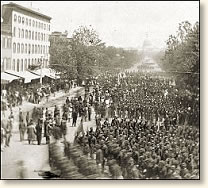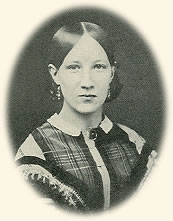|
The Civil War Ends
A Small Town's Reaction, 1865
The news of Lee's surrender at Appomattox on April 9 spread quickly through the North. The impact of the announcement on a small town in upstate New York was typical - a mixture of unbridled joy and sorrow for those who lost their lives in the conflict
Caroline Cowles Richards was a young woman of twenty-three
living in Canandaigua, New York, a farming village in the state's Finger Lakes
region. Caroline kept a
diary
of her daily experiences and reveals the sacrifices the community made as the
war progressed. Many of its young men joined the Union Army and the villagers
closely monitored the news from the war front. Sadly, a number of those who
went off to war did not return, losing their lives on the battlefields of Gettysburg,
the Wilderness, Spotssylvania, Petersburg and others. Caroline's diary was
published in 1913.
Caroline describes the scene as she awoke the day after Lee's surrender and is alerted to major news by the ringing of the church bells:
"Monday Morning, April 10
'Whether I am in the body, or out of the body, I know not, but one thing I know,' Lee has surrendered! and all the people seem crazy in
 |
The Grand Review of the Union Army
celebrating the end of the Civil War
Washington, D.C. May 23-24 1865 |
consequence. The bells are ringing, boys and girls, men and women are running through the streets wild with excitement; the flags are all flying, one from the top of our church, and such a 'hurrah boys' generally, I never dreamed of.
We were quietly eating our breakfast this morning about 7 o'clock, when our church bell commenced to ring, then the Methodist bell, and now all the bells in town are ringing. Mr. Noah T. Clarke [Principal of the local boys' school] ran by, all excitement, and I don't believe he knows where he is. No school to-day. I saw Capt. Aldrich passing, so I rushed to the window and he waved his hat. I raised the window and asked him what was the matter? He came to the front door where I met him and he almost shook my hand off and said, 'The war is over. We have Lee's surrender, with his own name signed.' I am going down town now, to see for myself, what is going on.
Later - I have returned and I never saw such performances in my life. Every man has a bell or a horn, and every girl a flag and a little bell, and every one is tied with red, white and blue ribbons. I am going down town again now, with my flag in one hand and bell in the other and make all the noise I can. Mr. Noah T. Clarke and other leading citizens are riding around on a dray cart with great bells in their hands ringing them as hard as they can. Dr. Cook beat upon an old gong.
The latest musical instrument invented is called the 'Jerusalem fiddle.' Some boys put a dry goods box upon a cart, put some rosin on the edge of the box and pulled a piece of timber back and forth across it, making most unearthly sounds. They drove through all the streets, Ed Lampman riding on the horse and driving it"
The euphoria over the war's end was shattered just a few days later with the news of Lincoln's assassination.
"April 15.-
The news came this morning that our dear president, Abraham Lincoln, was assassinated yesterday, on the day appointed for thanksgiving for Union victories. I have felt sick over it all day and so has every one that I have seen. All seem to feel as though they had lost a personal friend, and tears flow plenteously.
 |
| Caroline Richards 1860 |
How soon has sorrow followed upon the heels of joy! One week ago tonight we were celebrating our victories with loud acclamations of mirth and good cheer. Now every one is silent and sad and the earth and heavens seem clothed in sack-cloth. The bells have been tolling this afternoon. The flags are all at half mast, draped with mourning, and on every store and dwelling-house some sign of the nation's loss is visible.
Just after breakfast this morning, I looked out of the window and saw a group of men listening to the reading of a morning paper, and I feared from their silent, motionless interest that something dreadful had happened, but I was not prepared to hear of the cowardly murder of our President. And William H. Seward, too, I suppose cannot survive his wounds. [Seward did survive]
Oh, how horrible it is! I went down town shortly after I heard the news, and
it was wonderful to see the effect of the intelligence upon everybody, small
or great, rich or poor. Every one was talking low, with sad and anxious looks.
...I trust that the men who committed these foul deeds will soon be brought
to justice."
References:
Richards, Caroline, Village Life in America 1852-1872 (1913).
How To Cite This Article:
"The War Ends - A Small Town's Reaction, 1865" EyeWitness to History, www.eyewitnesstohistory.com (2004).
|






